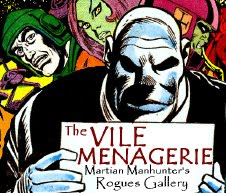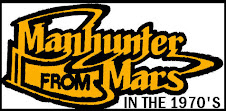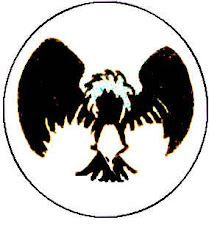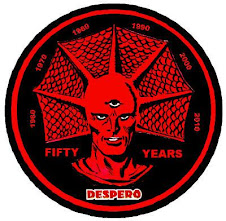
In The Comic Book Heroes, Gerard Jones put forth the theory that after the creative milestones and massive shake-ups of 1986, the industry needed a lighthearted romp like Justice League International. I don't think that explains the staying power of the series in the hearts of fans nearly a quarter-century down the line, which probably comes down to JLI's being the rare comic book that was actually funny. Not exactly a revelatory statement there, but I've found it interesting that of the three creators most associated with JLI; Keith Giffen, J.M. DeMatteis, and Kevin Maguire; only Giffen has had much success at comedic comics. Giffen of course ruined his reputation with the surrealist satire of Ambush Bug, and managed varying degrees of acceptance with Lobo, The Heckler, Trencher and other goofs. However, with the exception of Lobo's fan base missing the point, Giffen's comedy stylings only have a cult following. DeMatteis on his own is a pretty terrible comic, I think because he tries to turn in a madcap plot, rather than finding the humor in a relatively straight one. Maguire frustrates a lot of fans because we're always expecting something funny to be said by his expressive characters, and that just never happens without Giffen and DeMatteis.
My point is that it took at least three enormous talents to make Justice League International get funny and stay funny, because each brought something different to the table. Giffen is a pull-no-punches plotting madman, but his comedy tends to be cruel and observational. DeMatteis brings the heart and characterization, tempering Giffen's excesses, while being guided by Keith's inspiration. Maguire is the perfect medium for communicating the combination visually, really selling a line through his storytelling and expressions. Two of the three can still do well, but it takes all three to be great.
Another reason why Justice League International worked was that, through synergy, the book employed multiple types of comedy in any given issue. Everybody has their own unique sense of humor, so this was essential to hit every type of reader's funny bones to reach a consensus of comedy. Further, since a great deal of the impact of comedy comes from surprise, not knowing what type of joke would be coming from where offered the sweetness of the sucker punch.

The JLI members themselves facilitated this by embodying different techniques. Blue Beetle and Booster Gold were of the Abbott & Costello/Seinfeld & Costanza school, driven by opportunism and cluelessness, swapping out the role of straight and dunce as it suited them.
Mr. Miracle and Oberon were the schlubs, a more realistic but less calculated variation on Abbott & Costello that's popular in sitcoms. The henpecked husband and his n'er do well best pal get themselves into sticky situations for fun or profit while trying to escape the notice of the harridan wife, Big Barda.
Fire and Ice were the girlie variation, the Lucy and Ethel, with Fire the extrovert who loved boys and fashion, while Ice was the naive introvert with wisdom her street savvy girlfriend lacked. Fire specifically was like an attractive Phyllis Diller, which I guess would make her Chelsea Handler today.
Guy Gardner was the Mo Howard or the Andrew "Dice" Clay, the overconfident pig-headed jerk who provoked negative reactions from all around him, and often resorted to violence. In his younger days, Dennis Leary would have been perfect in this part. His extreme personality switches also recall Andy Kaufman.
Captain Marvel was the schlimazel who through little fault of his own winds up on the bad end of any situation, like Mr. Bean or Stan Laurel. G'nort was then the schlemiel, entirely responsible for screwing things up while coming out of it no better or worse than he came in, like early Jerry Lewis.
Batman was of course the cracker of the whip at first, occasionally launching into a Sam Kinison outburst, but usually more dry and dismissive, like George Carlin. Black Canary tended to stand off to the side and shake her head at the nonsense surrounding her, recalling Bea Arthur with a bit of Lily Tomlin thrown in.
Several characters never fell into the JLI "trap," usually exiting quickly, like Doctors Fate and Light. Justice League Europe found its niche by being the more series, straight super-team, in part because guys like Captain Atom just are not funny, and the rest of the team half-heartedly inserted generic humor. Power Girl managed a decent Sandra Bernhard, I suppose, while Elongated Man and Sue Dibny did their best Rob and Laura Petrie.
Most of the side characters, especially the ones created for the series, were vaudeville types. Manga Khan recalls Mel Brooks, and L-Ron early Woody Allen. Too many of the rest were goofy for goofiness' sake, and once the JLI roster stabilized, a lot of the surprise was gone. I think this explains why the book turned so bad so quickly towards the end of the Giffen/DeMatteis run.
J'Onn J'Onzz didn't have much to offer in the beginning, as he fell to the sober, somber side with Dr. Fate. As other characters left the book, the Martian Manhunter filled their vacancy, specifically in the cases of Batman and Black Canary. Hawkman took on the Kinison element, and J'Onzz was never quite acidic enough for Carlin. His sarcasm was a bit more mild-mannered, like Martin Mull. It also had more than a bit of the dry British bite, like John Cleese or Rowan Atkinson's Black Adder, but without the pretension. Ideally, J'Onn is hilariously droll, dropping stealth snickers that can be taken as straight or pointed, to the point where you're not sure if you were supposed to laugh. Grant Morrison got this, and left me grinning a number of times during JLA without the masses catching on that some funny was getting smuggled into their epic drama. I'm hoping we'll see more of this from Paul Cornell, because I'm frankly sick of the gloomy sourpuss Manhunter from Mars.






























7 comments:
I loved all your analogies to famous comedians/comediennes.
Captain Marvel as Stan Laurel? No wonder I have a soft spot for the Big Red Cheese.
Interesting theory about surprise being a big factor to the JLI's success. I think surprise is a big part of making anything funny. I never found the revisted "JLI" series ("I Can't Believe It's Not the Justice League," et al) to be *that* funny, and I never could put my finger on why exactly. There's a shift in the humor there that I can't quite explain. In the original JLI there was a nice balance of not taking the subject matter too seriously combined with (what came across as) genuine respect for its characters. In G&D's recent run on Booster Gold, it felt as though the characters were just means to the end of a joke rather than "real" people. JLI had some strong characterization during its heyday.
"Stan?" D'oh! Fixed.
I liked both "Formerly Known As" and "ICBINTJL" better than about half of the original JLI run. They were very jokey, but each had their serious portions and high points. Obviously, I think Fire and Guy leading Ice out of Hades was extremely affecting. I thought G&D balanced the new characters well, but was really happy when Guy finally showed up, since he's so unique amongst the crew. I don't think Booster Gold is a favorite of either creator, so he likely just got used for the yuks.
Dang it, I loved the old JLI. I admired J'onn for keeping his head, while all about him, were losing theirs.
And what a lot of people seem to forget, is that amongst all the humor and hi-jinks, they actually went out and fought some pretty heavy hitters.
Most of my favorite "funny" stories involved the Injustice League, but I usually hated the rest (Mr. Nebula, especially, but Manga Khan wore thin quick.) I preferred serious stories with funny moments. The first arc was pretty intense, between the Not-Avengers and the Gray Man. I didn't care for the machine stuff or Teasdale Imperative, but the Bialya intrigue was solid. Obviously, Despero's arc was awesome. Even Lobo was not someone to be taken lightly.
Didn't Lobo accidentally get welcomed into the League, until someone (Oberon?) came back to HQ and realized who he was? (And I remember thinking that was really funny.)
I like the serious mixed with the funny, too, which I like in most situations (TV, movies, etc.) Such as Ice's journey back from the underworld in Formerly Known As (or maybe it was the other one) and the battle with Despero. I just like balance in storytelling and I wish writers would take a little time to sit down and examine what they are writing. The G&D arc in Booster Gold was ALL silly ridiculousness ALL the time, which got annoying. (The General Glory arc got on my nerves a little bit, too.)
Except for the one with the cat. That's completely ridiculous and I STILL like that one. And #51, where J'onn, G'nort and Kilowog go out to dinner...
LOVED this series and still do. Your analysis is frighteningly dead-on. I never in a million years would have been able to relate the characters to real-world comedic archetypes. Well done!
I didn't pick up Justice League: Lost Generation, but I'll probably give the new JLI a try.
The Irredeemable Shag
http://firestormfan.com
It's still a bit 1st drafty, but I was tired and needed it done. I should have at least referenced Ed Norton (Art Carney,) either for Oberon or as G'nort's namesake.
Post a Comment